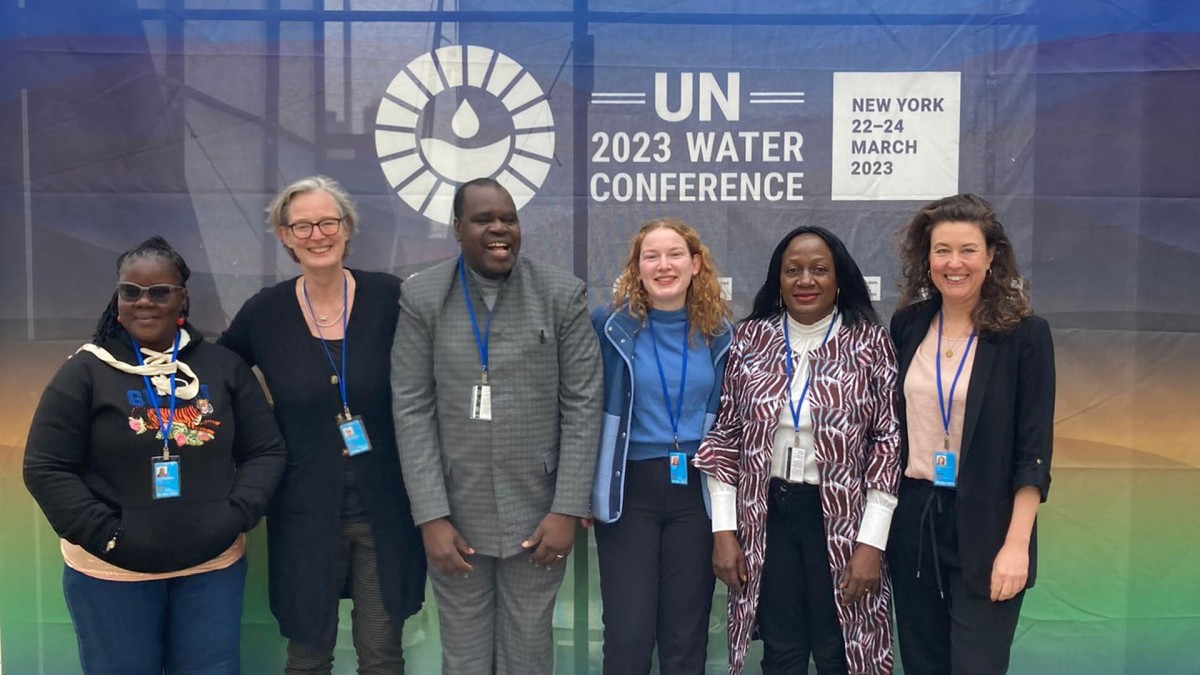Four months later: are we making the most of the momentum of the UN Water Conference?
This year in March the historic UN Water Conference took place in New York. More than 10.000 participants from 193 countries gathered to discuss worldwide water issues for the first time in nearly 50 years.
It was a valuable and inspiring experience. Simavi joined the Conference, together with four of our partners from Bangladesh, Ghana, Kenya and Uganda. We organized side sessions, and followed the high-level discussions on reaching SDG6, the sustainable development goal for water and sanitation for all by 2030.

We are not stakeholders, but rightsholders
On the very first night, during a civil society gathering, Pedro Arrojo-Agudo, the Special Rapporteur on the human rights to safe drinking water and sanitation, told us: ‘We are not stakeholders, we are rightsholders’.
And that is a message that we have taken with us throughout the conference; water is a human right, not merely an economic good. And to ensure that the rights of all people are respected, we need to be diverse and inclusive in our policies.
Launching the Water Justice Fund of Simavi and Women Win
That is exactly the reason why we, as Simavi organised the session “How to make the water action agenda gender transformative: connecting policy, practice, and research”. To put our money on the table our director Dieneke van der Wijk launched the Water Justice Fund, an initiative by Simavi and Women Win.
This fund aims to support local women with their climate adaptation ambitions and put them in the driver seat. Our commitment with the Water Justice Fund is officially published on the UN Website.
Commitments are no reason for complacency
So, what now? The conference is over, and the participants are back home again, with more than 800 voluntary commitments in their pockets. But there is no time for complacency. This should only be the beginning, not the end.
One of the outcomes was the request by more than 150 member states to install a Water Envoy at UN level. We think that is a good step towards ensuring accountability, but we need more than that.
High-level Forums should lead to inclusive action
The coming year will have some key moments where we will ensure that SDG6 and the Water Action Agenda are part of the discussions. The High-Level Political Forum on Sustainable Development, with a special day dedicated to water and sanitation this week is the first in a series of events.
Stockholm World Water Week, the SDG Forum, and the COP will follow. These large events are a good platform for high level commitments but should also translate into sustainable and inclusive action.
How we hold duty bearers accountable
One of the main questions that remains now, four months after the conference, is how the follow-up will be for voluntary commitments. The water action agenda consists of voluntary commitments, and therefore it is essential that we hold duty bearers accountable.
As will be reaffirmed at the High-Level Political Forum on Sustainable Development this week, to meet the global target of universal access by 2030, progress needs to increase by six times for safely managed drinking-water, five times for safely managed sanitation, and three times for basic hygiene. Access to safely managed drinking water, sanitation, and basic hygiene services is still out of reach for billions of people, particularly in rural areas and least developed countries.
Collecting 30.000 signatures for petition ‘Stop Sex for Water’
This is something Simavi and our partners take very seriously. In the Netherlands Simavi’s ‘Stop Sex for Water’-petition raised almost 30.000 signatures, resulting in a political motion being passed by Parliament to ask the minister of Foreign Trade and Development Cooperation to guarantee the access to safe water and sanitation for women and girls in areas vulnerable to climate change; and to make sure that climate finance is tailored to the specific interest and capacities of women and girls.
Influencing governments in Bangladesh and Uganda
In Bangladesh, our partner Zobair Hasan chief of Development Organisation of the Rural Poor (Dorp) has worked hard to keep the important outcomes of the conference on the agenda, by publishing articles, organizing discussions and engaging parliamentarians and senior government officials.
In Uganda our partner Yunia Musaazi, director of UWASNET, is dedicated to make sure that the Presidential Compact that was signed by the Ugandan government in New York to accelerate access to inclusive water and sanitation services, increasing budget allocations and delivering climate resilient WASH Systems, is effectively implemented and fulfilled.
Engaging the youth and engaging governments in Kenya and Ghana
Our partner Patrick Alubbe, director of Kenya Water for Health Organisation (KWAHO), is looking for opportunities to engage the youth by forming youth WASH parliaments to strengthen the voice of the communities.
Meanwhile, in Ghana our partner Mercy Amokwandoh from Hope for Future Generations (HFFG) continues to engage with the government on the Ghana Presidential Compact for WASH that was signed in New York. Making sure that the promises to establish a National Sanitation Authority, to reduce inequalities in water and sanitation services and to make Ghana’s cities the cleanest in Africa become reality.
Inspiration and new connections
The Un Water Conference in New York has inspired all of us to keep pushing for inclusive and gender transformative water action. With the new connections we have made and the renewed commitment of many governments we can make the difference. However, we also realize that these high-level events remain inaccessible for many rightsholders all over the world. Especially those voices need to be heard in the follow-up to the Water Action Agenda to make it a success. Only by working together will we achieve our goal: water and sanitation for all.
Brechje Oonk, lobby and advocacy-officer at Simavi


